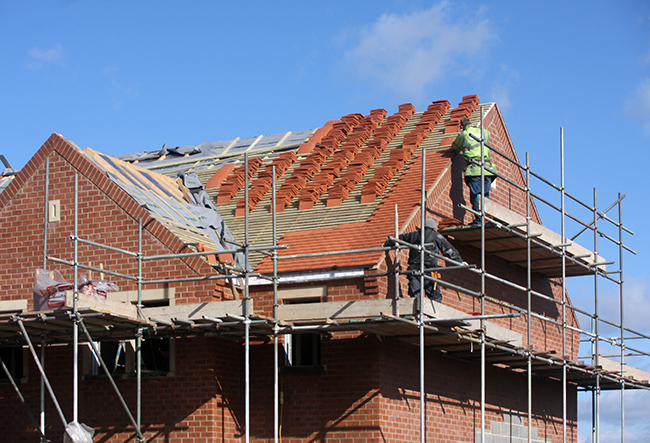With the triggering of Article 50, the UK can finally begin the process of divorce from the EU. Stephen Little looks at the possible implications for the mortgage and housing markets
With the triggering of Article 50, the UK can finally begin the process of divorce from the EU. Stephen Little looks at the possible implications for the mortgage and housing markets
Fears that the housing market would collapse following the vote to leave the EU certainly look overblown now.
Property prices have remained strikingly resilient and growth looks set to continue upwards.
Despite some initial turbulence after the referendum, the market has refused to be derailed by the vote to leave, holding up more strongly than expected so far.
Not only that, mortgage rates have been at record lows, aided by the decision of the Bank of England to cut base rate.
But what will happen now that Article 50 has been triggered?
Prime Minister Theresa May has signalled Britain will pursue a hard Brexit, losing access to the single market in exchange for control over immigration.
However, negotiations are likely to be fraught and many economists are predicting investment will drop as economic uncertainty increases.
This is likely to lead to weaker economic growth, which could in turn potentially affect house prices and mortgage rates.
[box style=”4″]
What is Article 50?
Last June the nation went to the polls following a fiercely contested battle between the Remain and Leave camps.
In a result which took many political commentators by surprise, Leave won by a majority of 51.9% against 48.1% for Remain.
Reputation tarnished, David Cameron announced his resignation as Prime Minister, paving the way for Theresa May to take the reins and lead Britain out of Europe.
However, the process of leaving the EU is not likely to be straightforward, with many experts warning it could take years before a post-Brexit trade deal is secured.
Article 50
Article 50 is the formal mechanism for leaving the EU. It forms part of the Lisbon Treaty, which was signed in 2007 and ratified in 2009 by the heads of EU states.
It gives the UK two years to negotiate terms with the EU, during which time it will still be bound by the rules of EU membership.
All 27 other member EU states have to agree unanimously to the terms of the deal, which all have veto.
If the UK does not manage to strike a deal within the two years, the treaties between the UK and the EU will no longer apply.
One thing is for sure, there are still likely to be a few twists and turns along the way as the divorce proceeds. Howard Archer, chief economist at IHS Global Insight, said that negotiations with the EU would likely take longer than the two-year time period stipulated.
“I don’t see the UK striking a deal within two years. My personal view is that we will come to a free trade agreement with the EU, with whatever access we get to markets arranged by industry or sector,” he said.
It has been estimated that crashing out of the EU without a trade deal could leave British exporters with an estimated extra £6 billion in costs.
“I don’t see us going onto World Trade Organisation tariffs if a deal is not signed, but if we did, it could be disastrous,” said Archer.
“A hard Brexit could be very bad news for the economy. There is going to be enormous economic uncertainty for a prolonged period, so I am fairly pessimistic overall.”
[/box]
House prices
Following the Brexit vote, UK property prices have remained relatively flat. However, property experts are widely forecasting a slowdown in the housing market this year as a result of economic uncertainty after the triggering of Article 50.
Despite house prices rising 6.5% last year, growth is expected to falter in 2017 as a decline in the economy, pressure on employment and a squeeze on spending power start to bite.
Nationwide predicts annual house price growth will fall to around 2% this year as the economy weakens, while Halifax has forecast it will be between 1% to 4%.
With inflation predicted to rise above 2.5%, this could mean house prices won’t increase in real terms.
Jeff Matsu, senior economist at the Royal Institution of Chartered Surveyors, said that while there was a lot of uncertainty surrounding Britain’s exit from the EU, he did not expect anything seismic to happen to house prices as a result of Article 50.
He said: “Coming off of the referendum result there was initially a very sharp knee jerk reaction where housing activity pretty much came to a standstill.
“However, this time we don’t expect a recurrence as the Prime Minister clearly laid out a timetable for the triggering of Article 50, so it won’t come as a surprise to anyone.”
Demand in the UK housing market continues to outstrip supply, with no signs of the crisis improving. Recent research by Yorkshire Building Society found that the UK has missed its house building targets by a whopping 1.2 million since 2004.
Meanwhile, the House of Lords Select Committee said in a report last year that 300,000 homes needed to be built each year to meet demand.
Matsu believes that the ongoing housing supply crisis coupled with high demand will continue to push up house prices, albeit at a slower pace.
“Demand far outweighs supply at the moment, so we expect to see that support modest price increases in the near term.”
Howard Archer, chief economist at IHS Global Insight, said house price growth will slow as a result of a weakening economy, but is unlikely to fall unless negotiations go badly.
“I think Article 50 will have a downward impact on house prices. The economy is clearly beginning to slow significantly, largely due to consumers starting to rein in their spending as higher inflation squeezes their purchasing power.
“The negotiation process is bound to have an unsettling impact on economic activity and increase uncertainty.
“House prices won’t fall unless things get really fractious during negotiations with the EU, but I think growth will be very weak.”
Archer said that rising inflation and limited income growth would also reduce people’s purchasing power even more.
“At most house prices will rise by 3% this year and going down to around 2% next year. After that it will depend on how things develop with the negotiations and terms of Brexit.”
London
House price growth in London is now being outpaced by regional cities such as Bristol and Manchester and is expected to grind to a halt later in the year.
A recent survey by Hometrack reveals that house price growth in the capital has fallen to 6.4% – the lowest level since 2013.
House prices in London are up 85% since 2009, but Savills predicts prime London prices will remain static over the next two years, with a recovery in growth not expected until 2019.
This is due to the drag on prices in the prime central London housing market, which fell by 6.9% last year.
Lucian Cook, director of Savills residential research, said: “I think most people are probably factoring in Article 50, so I don’t think it will necessarily have a significant impact on the market.”
It is widely expected that prime property prices in London will be hit the hardest by Brexit, with investors likely to remain cautious until negotiations are completed.
If financial firms lose passporting rights which allow them to trade freely across Europe, foreign companies with European headquarters in the capital could also choose to relocate, reducing demand for both commercial and residential properties.
However, a fall in the value of sterling could actually incentivise overseas investment by making the price of property cheaper.
Higher stamp duty and uncertainty over the EU referendum have already dampened prime London property prices, according to Savills.
“Weaker sterling has increased demand to a degree in the prime market, but some overseas buyers have been reluctant to take advantage of the fall in sterling due to higher stamp duty and transactional costs,” said Cook.
“There is still some uncertainty out there as to what happens to sterling going forward, so they will probably be factoring that into their thinking as well.
“I think the prime market will remain relatively sensitive to sentiment during negotiations and therefore I don’t think there will be any significant price growth over the course of the next two years.”
Interest rates
The Bank of England cut interest rates to the current record low of 0.25% in August 2016 as part of a range of measures designed to help boost demand following the vote to leave the EU.
However, since the referendum, the value of sterling has plummeted, increasing import costs and fuelling inflation.
The Bank predicts inflation will rise to 2.7% by the end of 2017, peaking at 2.8% in the first half of 2018, well above its 2% target.
So will the Bank raise interest rates in order to bring inflation back under control?
Matsu thinks a rise is unlikely. He said: “Over the next 12 months the Bank has pencilled in higher inflation heading to just under 3%, so in theory you could see the Bank raise interest rates in response.
“However, because it views the impact from inflationary forces as transitory, it is expecting to get back to its 2% inflation target. More of a concern for the Bank at the moment is keeping an eye on where wage growth is going and its impact on consumer spending.
“Even if the Bank was to increase interest rates later in the year it would be at a very slow and measured pace.”
Despite rising inflation, Archer does not expect the Bank to raise the interest rate until 2020 due to economic uncertainty.
“I know the Bank is worried about the inflation overshoot, but I think with the economy slowing this will be overlooked,” said Archer.
“The first hike won’t be until at 2020 as there will be too much uncertainty in the economy until then.”
Housebuilding
Housebuilders have expressed fears that that leaving the EU will reduce the already scarce supply of labour needed to build homes.
Uncertainty during the negotiation period could also make it more difficult to raise investment for projects.
On the plus side, free from the shackles of EU regulation, firms could have less red tape to deal with.
However, as most construction materials are imported there could be severe consequences for the UK building industry.
If sterling falls further contractors would likely face a significant rise in material costs, which could be passed on to buyers.
Sarah McMonagle, director of external affairs at the Federation of Master Builders, said the number one concern of firms in the building industry was the shortage of skills, which is likely to be exacerbated in the event of restrictions on immigration.
“What we really need to see from the government is some certainty on the status of EU workers in the construction and housebuilding sectors on whether they can stay,” she said. “We need a flexible immigration system that meets the needs of a sector reliant on EU workers.”
Currently, 12% of workers in the construction industry are from outside the UK and a large number of these are from the EU.
McMonagle said: “Our last survey found that 40% of our members said the skills shortage is a concern, so it could certainly endanger government house building targets unless we can have an ample supply of workers.
“Construction materials have been getting more expensive since the fall in the value of the pound.
Housebuilders already operating at low margins are seeing profits squeezed. Along with the skills shortage this could be a dampener on growth and increasing output.”
What will lenders do?
In the wake of the EU referendum and the Bank of England cutting interest rates, lenders slashed mortgage rates across the board.
Fixed rates plummeted to record lows and this led to a rush of activity in the mortgage market as borrowers looked to lock into long-term deals before rates go up again.
First-time buyers have benefitted hugely from a significant reduction in mortgage costs.
Data from Moneyfacts shows that since February last year, average two-year fixed rates have dropped from 4.26% to 3.98% for borrowers with a 5% deposit whilst the average five year fix has fallen from 4.76% to 4.43% over the same period.
But what is likely to happen this time around?
David Hollingworth, associate director at London & Country Mortgages, said: “Article 50 shouldn’t come as a surprise to the markets so funding costs for lenders should remain relatively stable.
“Rates are starting to edge up again, but I think really it is very difficult to predict changes.
“Fixed rates across the board – especially five-year ones – are very low indeed because there is lots of competition in the market. There are lots of lenders keen to lend.
“What of course we don’t know is whether we will see a need for lenders to move rates in response to Article 50.
“We do know that higher inflation is already feeding through as a result of the weakening of sterling and that is going to start hitting people in the pocket each month.
“Borrowers can’t take it for granted that rates will be low forever, but what they can do is put some certainty into their monthly mortgage payment by fixing.”
Archer said that lenders could introduce stricter affordability checks in response to a weaker economy.
“With the economy likely to be struggling and unemployment rising, you may find the banks become more careful in checking people’s ability to meet their mortgage commitments,” he said.
“I can’t see mortgage interest rates rising much – they certainly won’t get any lower. Some banks have actually pulled their lowest ones. They might edge up a little but I don’t see them going anywhere significant in the next couple of years.”
[box style=”4″]
Why haven’t house prices crashed since Brexit?
During the run-up to the EU referendum many economists were predicting that house prices could come crashing down in the event of a Brexit vote.
The International Monetary Fund said exiting the EU could send property prices plummeting while analysis by the Treasury showed that up to 18% could be knocked off the value of people’s homes within two years.
However, the widespread house price crash that the prophets of doom and gloom were forecasting failed to materialise. Average house prices are now well above £200,000 and growth looks set to continue upwards, although at a slower pace.
The mortgage market also managed to largely defy Brexit jitters, with interest rates hitting record lows.
So how did the experts get it so wrong?
One reason the housing market managed to hold up was because the wider economy performed better than expected following the referendum.
Consumer spending rose – boosted by a weakened pound – and the economy continued to expand at a rate broadly similar to that seen in 2015. The UK jobs market has remained buoyant and wages have continued to rise.
When people are in employment they can afford to pay their mortgages or take out a new one.
With higher economic growth and rising incomes people are able to spend more on property, which leads to an increase in demand and pushes prices up.
Demand has also been supported by the Bank of England cutting interest rates to a new record low of 0.25% in August as part of a range of measures designed to prevent a post-Brexit recession.
It also revealed a stimulus package to boost the economy and a new funding scheme to help banks pass on the base rate cut to borrowers. Since the cut we have seen record low mortgage rates, allowing borrowers to save hundreds of pounds.
Decades of chronic undersupply also means the UK housing market is insulated from recession or any economic shocks.
Jeff Matsu, RICS senior economist, said that as demand continued to outpace supply, house prices had not been hit.
“Supply is still very much constrained. People that want to buy aren’t able to because of affordability issues or simply because they can’t find the type of houses they are looking for,” he said.
Peter Antonioni, co-author of Economics for Dummies and senior teaching fellow at the UCL School of Management, said that just because things appeared to be going swimmingly right now it did not mean there would not be any problems further down the line.
“It is too soon to tell what will happen as a result of Brexit. Forecasting in its nature is just not an easy thing to do, especially with something as complicated as the economy.
“Economists are not a monolithic group of people – they have different perspectives on things.
“Even though you have got theories to guide you about what you think will happen, you can’t necessarily jump to a prediction that is going to be satisfying in all cases.”
[/box]
















